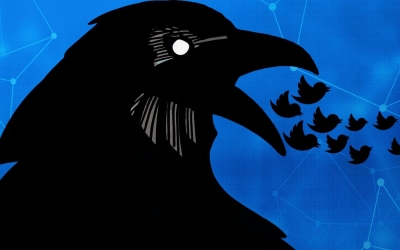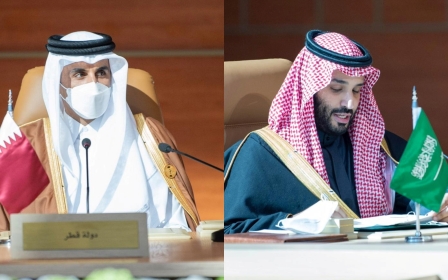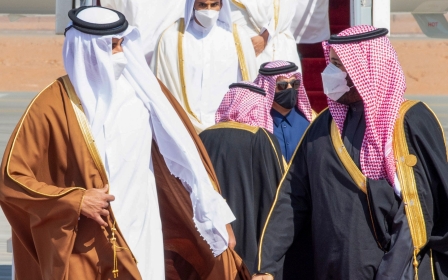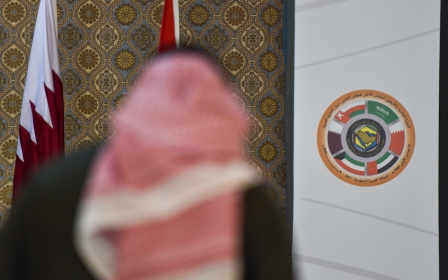Qatar blockade: Saudi deal raises questions about prisoners, flight paths and bots
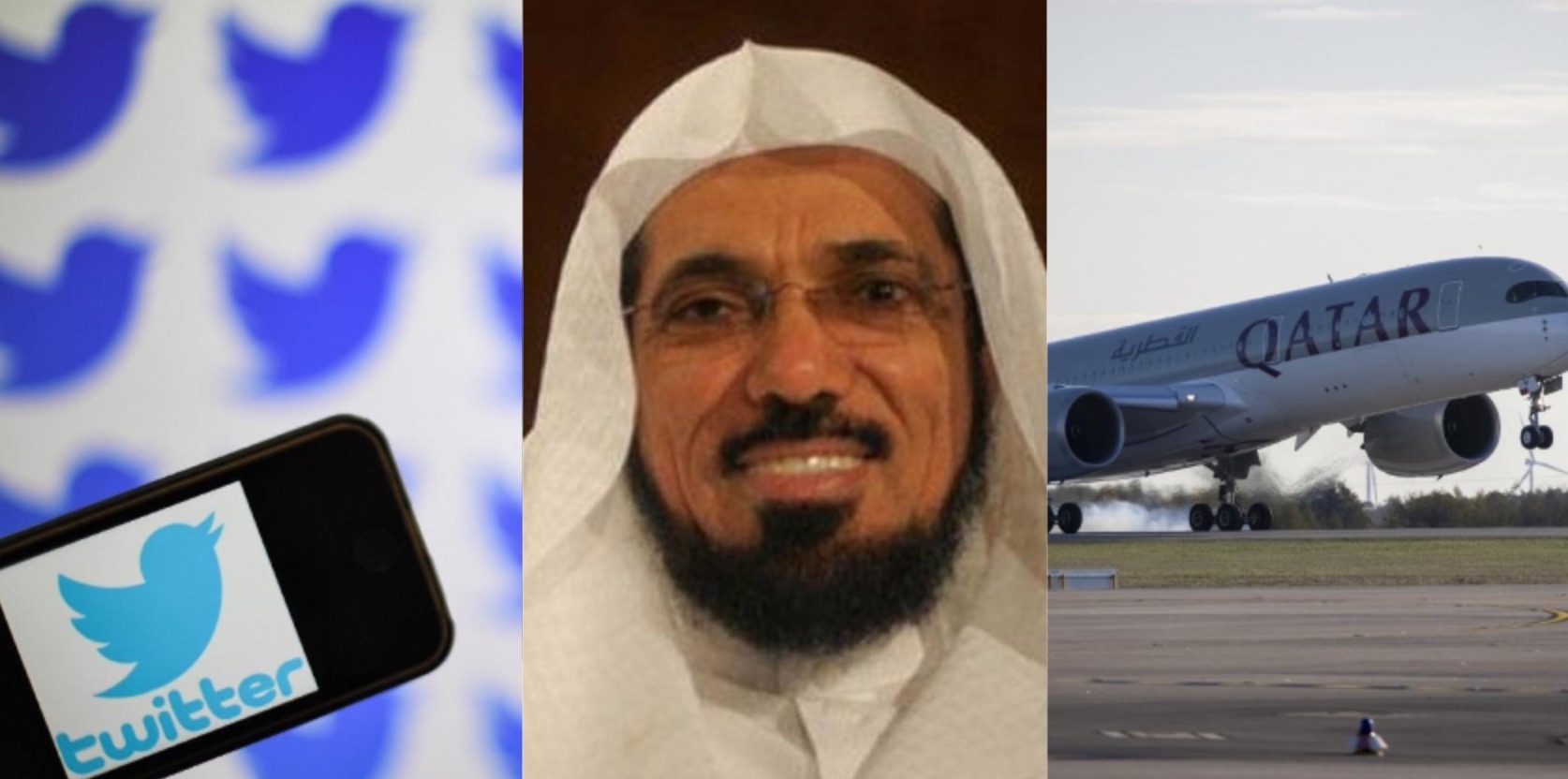
When Kuwait’s foreign minister announced on Monday that Saudi Arabia would be lifting its land and air blockade placed on Qatar nearly four years ago, the news left many questions unanswered about the status of political prisoners, flight paths and Saudi bot networks.
In 2017, Saudi Arabia, the United Arab Emirates, Bahrain and Egypt severed diplomatic, trade and travel ties with Qatar over claims that Doha supported terrorism - a charge the country has long denied.
Saudi Crown Prince Mohammed bin Salman said on Tuesday that Gulf states had signed an agreement on "solidarity and stability" at a summit to end Riyadh's embargo against Qatar.
Bin Salman thanked the United States and Kuwait for mediating the agreement and said: "These efforts helped us reach the agreement of the al-Ula statement that will be signed at this summit, where we affirm our Gulf, Arab and Islamic solidarity and stability."
As world leaders attended the Gulf Cooperation Council (GCC) summit on Tuesday, many questions remain unanswered about what happens next - with the other countries embargoing Qatar only following suit in re-establishing ties on Tuesday evening.
Social media, meanwhile, was abuzz over what this development might mean regarding a number of issues stemming from the blockade.
Prisoners
Many highlighted the issue of prisoners arrested for expressing criticism of the blockade.
One of the most notable cases is that of Salman al-Odah, an internationally renowned progressive Saudi Islamic scholar, detained after tweeting a prayer for reconciliation between Saudi Arabia and Qatar.
The charges against Odah included exposing "injustices towards prisoners" and "expressing cynicism and sarcasm about the government’s achievements".
The son of the jailed scholar recently took to Twitter to say that his father was “being killed slowly” in detention. Abdullah al-Odah said that his father’s health was deteriorating dramatically in recent months, including losing almost half of his ability to hear and see, and was facing medical negligence.
Despite calls from rights groups such as Amnesty International for his release, Odah remains behind bars.
A reminder that Salman al-Odah was arrested more than three years ago over a tweet expressing hope for Gulf reconciliation, which now appears to be happening.
— Daniel Wickham (@DanielWickham93) January 4, 2021
Al-Odah remains imprisoned to this today, and has now lost half his eyesight and hearing according to his family. pic.twitter.com/qaIutPYBQ6
Michael Page, the deputy director of Human Rights Watch in the Middle East, called on authorities to release detainees now that the breakthrough agreement had been made.
“Now that Saudi Arabia is easing tensions and opening borders with Qatar, how about releasing detainees like Salman al-Odah, accused of opposing a blockade (that only ended up separating families, stranding workers and interrupting people’s medical care)?” he said on Twitter.
Other dissidents, writers and scholars were also detained following the 2017 blockade, including eight intellectuals and writers who were taken from their homes in Riyadh.
Some of the other journalists, writers and entrepreneurs arrested, according to London-based Saudi rights group ALQST, include Bader al-Rashed, a journalist who wrote about Yemen and Saudi Arabia, Waad al-Mohaya, a podcast presenter, and Fouad al-Farhan, a blogger, among others.
Flight paths
Since the blockade started, flights have been interrupted and rerouted, as Saudi Arabia, Bahrain, the UAE and Egypt all closed their airspace to Qatar-registered flights.
The air blockade had forced fights to take lengthy detours, often inconveniencing passengers and causing them to take long travel routes.
Now, as Saudi Arabia has agreed to open its airspace to Qatar, many are looking for further details on flight paths and announcements from Bahrain and Egypt on airspace bans.
Important: While #GCCsummit continues, the NOTAMs (notices to flight crew, which explain airspace access) remain the same as when the blockade of Qatar started ✈️⛔️
— Alex Macheras (@AlexInAir) January 5, 2021
Saudi, UAE, Bahrain & Egypt have not yet removed airspace bans on Qatar👇🏽 but we’re expecting this to change soon pic.twitter.com/an6pEKl8N2
Saudi bots
Over the years, online bots peddling pro-Saudi propaganda and spreading fake news, often related to Qatar, Iran and Turkey, have made headlines and targeted prominent journalists and public figures.
Bot accounts typically copy-and-paste the same content and spread it across social media networks in a short period of time, often looking like plausible accounts and featuring real people in the profile photos. However, they often do not interact with one another and focus mainly on broadcasting information.
The accounts will often tweet hundreds or thousands of times a day, to spread content or hashtags quickly. One such example occurred in 2018, when conspiracy theories were spread about Turkish involvement in the murder of Washington Post and Middle East Eye journalist Jamal Khashoggi.
Now that Saudi Arabia has ended the blockade, many are questioning what will happen to the network of bots.
Some social media users predicted that following the announcement, Saudi bots created to be used against Qatar would become obsolete.
I think all the Saudi bots created against Qatar will be made redundant now 👾
— Chima (@ChimaElbialy) January 4, 2021
Reem Abdellatif, an Egyptian-American journalist, questioned what would happen to the bots and trolls that were often used to spread propaganda on behalf of Saudi Arabia and Egypt.
So after #GCC reconciliation, what happens to the Muslim Brotherhood boogeyman card used by Saudi, Egypt, Bahrain, UAE?
— Reem Abdellatif - ريم عبداللطيف (@Reem_Abdellatif) January 4, 2021
What happens to all the bots and trolls?
Poof, be gone.
Last year, Twitter deleted thousands of accounts from Saudi Arabia, which they said amplified content praising Saudi leadership and were critical of Qatar and Turkish activity in Yemen.
The social media platform said that the Saudi-linked accounts were run out of the kingdom and the United Arab Emirates, where Twitter's Middle East headquarters is based, as well as Egypt.
Twitter said it took the actions because the accounts violated its policies and represented a targeted attempt to undermine public conversation.
Saudi dissident Khashoggi had complained of threats he had received from accounts supportive of bin Salman before his brutal murder at the kingdom's consulate in Istanbul in October 2018.
Since then, two journalists from Qatar-based Al Jazeera, Ola al-Fares and Ghada Oueiss, have also been targeted by thousands of Saudi Twitter accounts in a smear campaign.
Several disinformation campaigns have also been promoted by Saudi bots over the years, including fake news about a coup in Qatar on the third anniversary of the blockade.
Middle East Eye propose une couverture et une analyse indépendantes et incomparables du Moyen-Orient, de l’Afrique du Nord et d’autres régions du monde. Pour en savoir plus sur la reprise de ce contenu et les frais qui s’appliquent, veuillez remplir ce formulaire [en anglais]. Pour en savoir plus sur MEE, cliquez ici [en anglais].


